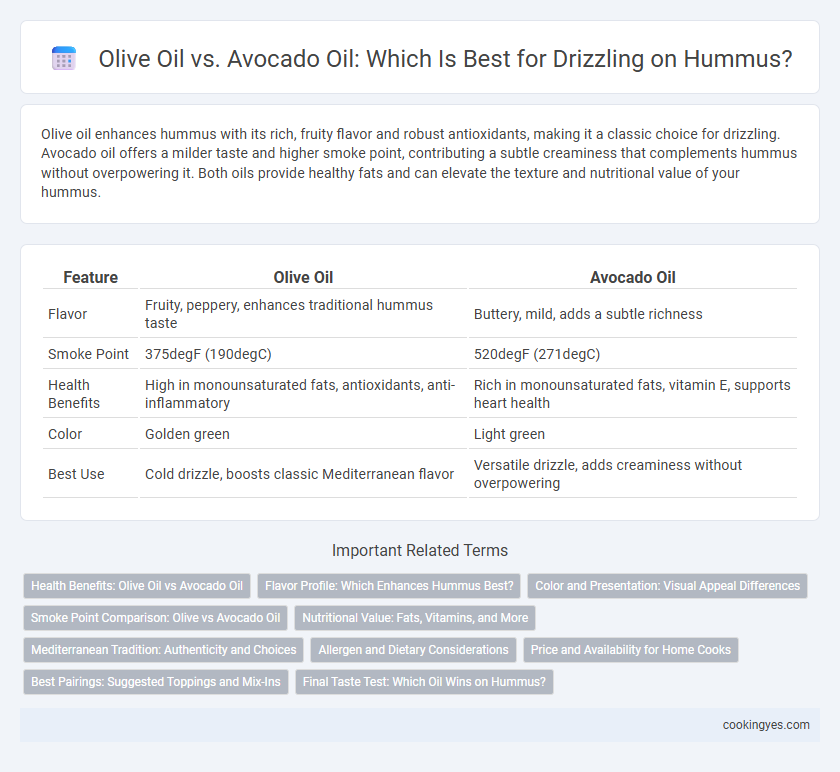Olive oil enhances hummus with its rich, fruity flavor and robust antioxidants, making it a classic choice for drizzling. Avocado oil offers a milder taste and higher smoke point, contributing a subtle creaminess that complements hummus without overpowering it. Both oils provide healthy fats and can elevate the texture and nutritional value of your hummus.
Table of Comparison
| Feature | Olive Oil | Avocado Oil |
|---|---|---|
| Flavor | Fruity, peppery, enhances traditional hummus taste | Buttery, mild, adds a subtle richness |
| Smoke Point | 375degF (190degC) | 520degF (271degC) |
| Health Benefits | High in monounsaturated fats, antioxidants, anti-inflammatory | Rich in monounsaturated fats, vitamin E, supports heart health |
| Color | Golden green | Light green |
| Best Use | Cold drizzle, boosts classic Mediterranean flavor | Versatile drizzle, adds creaminess without overpowering |
Health Benefits: Olive Oil vs Avocado Oil
Olive oil, rich in monounsaturated fats and antioxidants like polyphenols, supports heart health and reduces inflammation when drizzled over hummus. Avocado oil also contains high levels of monounsaturated fats and vitamin E, promoting skin health and lowering cholesterol. Both oils offer distinct health benefits, with olive oil excelling in anti-inflammatory properties and avocado oil providing a higher smoke point for cooking versatility.
Flavor Profile: Which Enhances Hummus Best?
Olive oil offers a rich, fruity, and slightly peppery flavor that enhances the traditional Mediterranean taste of hummus, complementing its creamy texture. Avocado oil provides a milder, buttery, and slightly nutty profile that adds subtle richness without overpowering the chickpea base. For classic hummus, olive oil is generally preferred for its robust flavor, while avocado oil suits those seeking a gentler, less assertive drizzle.
Color and Presentation: Visual Appeal Differences
Olive oil adds a rich golden hue to hummus, enhancing its traditional Mediterranean look and making it visually inviting. Avocado oil offers a lighter, more translucent greenish tint that contributes a subtle freshness and modern twist to hummus presentation. Choosing between olive oil and avocado oil for drizzling significantly impacts the color vibrancy and overall aesthetic allure on the plate.
Smoke Point Comparison: Olive vs Avocado Oil
Olive oil has a smoke point ranging from 375degF to 410degF (190degC to 210degC), making it suitable for drizzling on hummus without risking a burnt flavor. Avocado oil boasts a higher smoke point, typically around 520degF (271degC), which ensures stability and maintains its rich, buttery flavor even at higher temperatures. This difference means avocado oil can offer a smoother, less bitter drizzle on hummus, especially when slight heating is involved.
Nutritional Value: Fats, Vitamins, and More
Olive oil and avocado oil both enhance hummus with healthy fats, yet olive oil is rich in monounsaturated fats and contains antioxidants like vitamin E and polyphenols that support heart health. Avocado oil also provides monounsaturated fats but has a higher content of vitamin E and lutein, which promote skin and eye health. Both oils contribute to the creamy texture and nutritional profile of hummus, though olive oil is more traditional for drizzling.
Mediterranean Tradition: Authenticity and Choices
Olive oil is deeply rooted in Mediterranean tradition, offering a rich, fruity flavor that enhances the authenticity of hummus with its antioxidant properties and healthy monounsaturated fats. Avocado oil, though less traditional, provides a mild, buttery taste and high smoke point, appealing to those seeking a subtle twist while maintaining nutritional benefits. Choosing olive oil preserves the cultural essence of hummus, highlighting its heritage, whereas avocado oil offers a modern alternative for flavor variation and versatility.
Allergen and Dietary Considerations
Olive oil is a traditional choice for hummus drizzling, favored for its rich flavor and antioxidant properties while being suitable for most dietary needs, including vegan and gluten-free diets. Avocado oil serves as a hypoallergenic alternative, ideal for individuals with olive allergies or sensitivities, and offers a high smoke point that preserves the nutritional integrity of the drizzle. Both oils provide healthy fats but selecting between them depends on specific allergen concerns and dietary preferences such as avoiding nightshades or seeking a neutral taste profile.
Price and Availability for Home Cooks
Olive oil is generally more affordable and widely available in most grocery stores, making it a cost-effective choice for home cooks drizzling over hummus. Avocado oil tends to be pricier and less commonly stocked, which may limit accessibility for everyday kitchen use. Choosing olive oil offers both economical value and ease of purchase without compromising flavor enhancement.
Best Pairings: Suggested Toppings and Mix-Ins
Extra virgin olive oil enhances hummus with its rich, peppery flavor and traditional Mediterranean authenticity, perfectly pairing with toppings like za'atar, pine nuts, and fresh parsley. Avocado oil offers a milder, buttery taste and a higher smoke point, making it ideal for drizzling over roasted vegetables, chili flakes, or toasted sesame seeds to add subtle creaminess. Both oils can be combined with lemon zest or garlic powder to elevate the hummus experience while complementing ingredients tailored to each oil's unique profile.
Final Taste Test: Which Oil Wins on Hummus?
Olive oil delivers a robust, fruity flavor that enhances hummus with traditional Mediterranean notes, while avocado oil offers a milder, buttery taste and a smoother finish. In a final taste test, olive oil's boldness tends to complement the chickpeas and tahini more effectively, making it the preferred choice for authentic hummus drizzling. Although avocado oil provides a subtle creaminess, olive oil consistently wins for adding depth and richness to the overall flavor profile.
Olive Oil vs Avocado Oil for Hummus Drizzling Infographic

 cookingyes.com
cookingyes.com